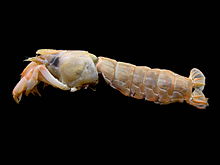
Back Gebideus Catalan Gebiidea French 쏙하목 Korean Gebiidea Dutch Gebiidea NB Táłtłʼááh łeeyiʼ chʼosh bikágí ntłʼizígíí NV Gebiidea Russian Gebiidea Ukrainian
| Gebiidea | |
|---|---|

| |
| Upogebia deltaura | |
| Scientific classification | |
| Domain: | Eukaryota |
| Kingdom: | Animalia |
| Phylum: | Arthropoda |
| Class: | Malacostraca |
| Order: | Decapoda |
| Suborder: | Pleocyemata |
| (unranked): | Reptantia |
| Infraorder: | Gebiidea de Saint Laurent, 1979 |
| Families | |
Gebiidea is an infraorder of decapod crustaceans. Gebiidea and Axiidea are divergent infraoders of the former infraorder Thalassinidea. These infraorders have converged ecologically and morphologically as burrowing forms.[1] Based on molecular evidence as of 2009, it is now widely believed that these two infraorders represent two distinct lineages separate from one another. Since this is a recent change, much of the literature and research surrounding these infraorders still refers to the Axiidea and Gebiidea in combination as "thalassinidean" for the sake of clarity and reference.[1] This division based on molecular evidence is consistent with the groupings proposed by Robert Gurney in 1938 based on larval developmental stages.[2]
The infraorder Gebiidea belongs to the clade Reptantia, which consists of the walking/crawling decapods (lobsters and crabs). The cladogram below shows Gebiidea's placement within the larger order Decapoda, from analysis by Wolfe et al., 2019.[3]
| Decapoda |
| |||||||||||||||||||||||||||
| |
Gebiidea comprises the following families:[4]
- Axianassidae Schmitt, 1924
- Laomediidae Borradaile, 1903
- Thalassinidae Latreille, 1831
- Upogebiidae Borradaile, 1903
However, Axianassidae is sometimes considered to be a junior synonym of Laomediidae.[5][6]
- ^ a b Dworschak, Peter C. (2012). Treatise on Zoology - Anatomy, Taxonomy, Biology. The Crustacea, Volume 9 Part B. BRILL. pp. 109–100. ISBN 9789047430179.
- ^ Pohle, G. and Santana, W., Gebiidea and Axiidea (=Thalassinidea), in Atlas of Crustacean Larvae, Baltimore: Johns Hopkins Univ. Press, 2014, pp. 263–271.
- ^ Wolfe, Joanna M.; Breinholt, Jesse W.; Crandall, Keith A.; Lemmon, Alan R.; Lemmon, Emily Moriarty; Timm, Laura E.; Siddall, Mark E.; Bracken-Grissom, Heather D. (24 April 2019). "A phylogenomic framework, evolutionary timeline and genomic resources for comparative studies of decapod crustaceans". Proceedings of the Royal Society B. 286 (1901). doi:10.1098/rspb.2019.0079. PMC 6501934. PMID 31014217.
- ^ Sammy De Grave; N. Dean Pentcheff; Shane T. Ahyong; et al. (2009). "A classification of living and fossil genera of decapod crustaceans" (PDF). Raffles Bulletin of Zoology. Suppl. 21: 1–109. Archived from the original (PDF) on 2011-06-06.
- ^ "Axianassidae Schmitt, 1924". WoRMS. World Register of Marine Species. 2023. Retrieved 23 April 2018.
- ^ Kensley, Brian; Heard, Richard (25 September 1990). "THE GENUS AXIANASSA (CRUSTACEA: DECAPODA: THALASSINIDEA) IN THE AMERICAS" (PDF). Proc. Biol. Soc. Wash. 103 (3): 558–572.